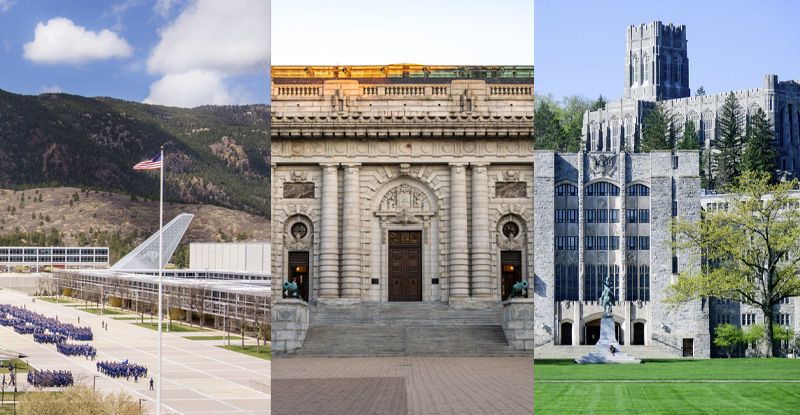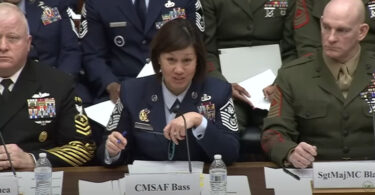By Shawn Fleetwood | The Federalist
Since returning to office, President Trump has taken significant action to dramatically overhaul America’s broken education system for the better. Whether it’s been his ongoing mission to shutter the Department of Education or prohibit “radical, anti-American ideologies” in K-12 schools, the president has demonstrated a clear commitment to ensuring quality educational opportunities for the country’s youth.
But amid the backdrop of these efforts to reform traditional academic institutions are documented problems with a different kind of school: America’s military academies.
Intended to educate and train the next generation of warfighters, these once-premiere military schools have been caught up in some of the biggest cultural battles of the modern era.
Much like the U.S. armed forces under former President Joe Biden, producing capable future service members took a backseat to unhealthy fixations with leftist ideologies and upholding the academies’ “image” among the American public.
Speaking with The Federalist, former West Point and Naval Academy officials explained how the DEI “decay” at these institutions runs deep. They also described how Trump and Defense Secretary Pete Hegseth can restore these previously coveted schools to their former glory, bringing meritocracy and lethality back to America’s military.
“You need leaders that are going to go into those academies and prioritize the academies’ mission instead of protecting [their] reputations,” former West Point instructor and retired Army Green Beret Ken Segelhorst told The Federalist.
Broken Admission Standards
Like with any academic institution, a military school is only as good as the students it enrolls. But what happens when these academies make their admissions policies based on anything other than merit?
Speaking with The Federalist, former Naval Academy professor Bruce Fleming claimed that military institutions like the Naval Academy often took factors such as an applicant’s race or sex into consideration during the admissions process.
The former English teacher was on staff at the Naval Academy for 30 years, during which he briefly served on the school’s admissions board. He noted how “the academy [went] on about how it lets in the ‘best’ and the ‘brightest,’” but “as it turns out, that’s not the case.”
“By our own standards, [the Naval Academy accepted] less qualified applicants merely because they self-identified as non-white,” Fleming said. “We [got] people filling slots who are guaranteed to be the officers [and] who will defend taxpayers who come in as less qualified.”
Fleming is no stranger to voicing concerns about the decision-making at the academy, which has included penning numerous op-eds (including at The Federalist) detailing what he views as problems at the school. His criticisms have received pushback and ire from Naval Academy leadership, who fired Fleming in 2018 over allegations of classroom impropriety by several students.
The academy reinstated him — though not to the classroom — in the summer of 2019 after a U.S. Merit Systems Protection Board judge found “credibility issues” with one of the accusing students, the Associated Press reported. However, Fleming told The Federalist that a panel on the Board overturned that ruling in January 2024, leading to his dismissal from the academy (again).
It’s not just the Naval Academy that has a history of taking an applicant’s “diverse” background into account during the admissions process, however. Segelhorst, who served as a West Point assistant professor and course instructor between 2020-2022, told The Federalist that the Army school has considered such details when analyzing the applications of prospective cadets.
“It was very clear that [diversity] was a very big priority,” Segelhorst said. West Point “would highlight the work that the admissions had been doing to admit people from different favored demographics in order to achieve their diversity goals.”
The retired Green Beret further contended that the school had an overzealous focus on athletics that seeped into the admissions process. He claimed if an applicant was an “exceptionally good athlete, [West Point was] more than willing to kind of look the other way on all other issues.” Fleming alleged a similar dynamic existed during his time at the Naval Academy.
Neither the Naval Academy nor West Point have been shy about their consideration of so-called “diversity” and other non-meritocratic factors in their respective admissions processes. Under the Biden administration, government officials fought in federal court to maintain the use of such policies at the academies.
These court arguments were the result of lawsuits filed against the schools (and later against the Air Force Academy) by Students for Fair Admissions. Several years ago, this same group successfully sued high-profile colleges over their use of affirmative action in admissions, which led to the U.S. Supreme Court ruling such policies in colleges unconstitutional in the summer of 2023. The court’s decision did not address the use of affirmative action in America’s military academies, however.
Hostile Atmosphere
It’s not just the obsession with left-wing, DEI-style politics that have been reported as issues at the academies. Both Segelhorst and Fleming suggested the school’s environments have been hostile to individuals who expressed views or raised questions that challenged academy policy and the “image” of the institutions.
In past conversations with his students, Fleming noted how midshipmen were “very aware” of the Naval Academy’s embrace of affirmative action policies. “They’re not dumb. They can see that [some of their classmates] are far less qualified … [and] it infuriates them,” he said.
Fleming went on to note how he observed midshipmen often felt pressure to stay silent when it came to expressing their frustrations on such issues. The Naval Academy culture, he noted, “is one of fear.”
“It’s not, ‘Hey, you guys, what do you think?’” about any given policy or issue, Fleming said. “As a professor, it [drove] me wild. But as a taxpayer, it drives me even more wild because we’re not making the strongest military [we can] by [having open] debate.”
Segelhorst noted a similar dynamic while working at West Point. He said a lot of cadets were “very aware” and “disappointed” in the school’s admissions standards but were either too afraid to speak out due to potential retaliation from the administration or were prohibited from doing so as a result of how the school used non-disclosure agreements (NDA) to prevent cadets from “sharing information they [got] on sensitive topics, like some of the transgender, DEI training.”
“All the academies … are focused on protecting their reputation. They will do just about anything to protect the reputation and legacy” of their institutions, Segelhorst said.
Back to Basics
So, how can the Trump administration rectify these issues and return America’s service academies to glory? During the first months of Trump’s second term, a slew of executive orders and efforts have already taken aim at the pervasive DEI policies plaguing institutions. But decades of rot at America’s top military schools can’t be weeded out overnight.
Fleming argued the new administration must be unequivocal in ending sex and racial “qualifiers” in admissions and go back to judging applicants purely on merit — a policy change that is seemingly already underway.
A Justice Department court filing made public late last month revealed that the Naval Academy ordered the end of its consideration of race and sex in their admissions policies in February following Trump’s executive orders restoring meritocracy to the military.
When pressed on its compliance with the administration’s orders barring the use of affirmative action policies, West Point referred The Federalist to the Justice Department for comment. The Federalist also pressed the Air Force Academy regarding its compliance with the administration’s directives.
In a statement to The Federalist, Justice Department spokeswoman Natalie Baldassarre said she is “not sure why West Point” told The Federalist to reach out to the DOJ over the matter. Baldassarre then referred The Federalist to a Jan. 29 memo from Hegseth, which stipulates, “No DoD Component will establish sex-based, race-based, or ethnicity-based goals for organizational composition, academic admission, or career fields.”
An Air Force Academy representative told The Federalist that the school “complies with the [president’s] executive order and Department of Defense guidance related to academic admission, and beginning with the Class of 2029, [it has] masked race, sex and ethnicity data throughout the entire admissions process.”
The Naval Academy did not respond to The Federalist’s request for comment.
Meanwhile, Segelhorst called on the Trump administration to restore standards and transparency to America’s military academies. He further advised the president and his team to ensure the schools’ respective Boards of Visitors are comprised of individuals who will ensure proper oversight and that academy staff are complying with the commander-in-chief’s orders.
To “make them prestigious institutions again,” Segelhorst said, “you need the right leadership to go in, do a fair debt, and bring them back out of the state of decay [they’re in].”
Shawn Fleetwood is a staff writer for The Federalist and a graduate of the University of Mary Washington. He previously served as a state content writer for Convention of States Action and his work has been featured in numerous outlets, including RealClearPolitics, RealClearHealth, and Conservative Review. Follow him on Twitter @ShawnFleetwood
More by Segelhorst:
West Point: “A once storied institution overcome by corruption”
DoDEA’s DEI Agenda: Are Military Schools Pushing Ideological Activism?
Fleming:
30-Year Naval Academy Teacher Details Depth Of DEI Rot In America’s Military Institutions
It’s Not Just West Point. U.S. Military Academies Have Become Disneyland For Politicians








Leave a Comment